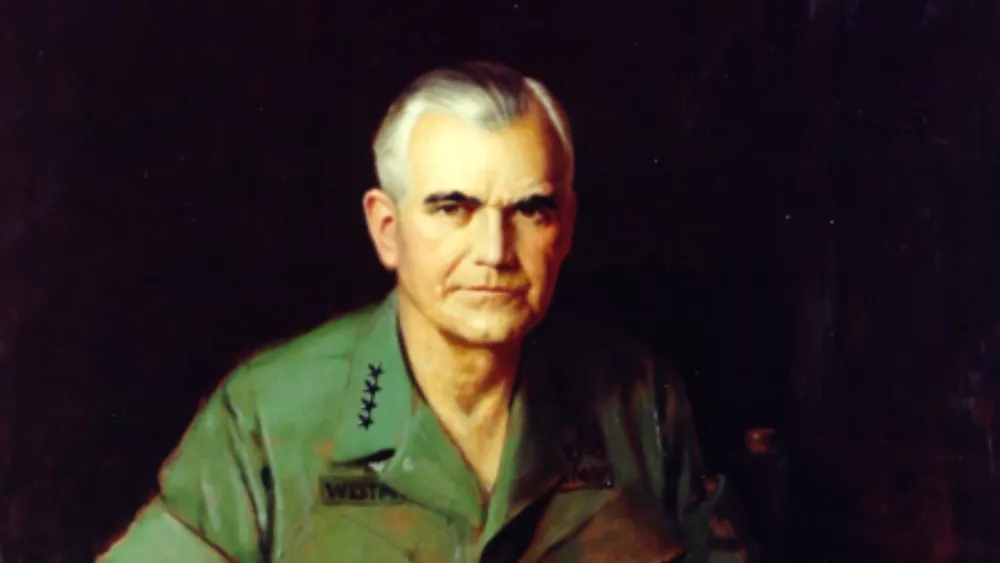William Westmoreland was a respected U.S. Army general. He commanded American forces during the Vietnam War (1964-1968) and later served as Chief of Staff (1968-1972).
His strategy of attrition, relying on artillery and air power, aimed to deplete the enemy’s manpower and resources.
However, mounting casualties and waning public support rendered his approach politically and militarily unsuccessful. Westmoreland’s refusal to adapt and address critical issues further complicated the war’s complexities.
William Westmoreland on Pursuing Excellence and Rising Through the Rank
Born in 1914 in Spartanburg County to Eugenia Talley Childs and James Ripley Westmoreland, William Childs Westmoreland’s early years were shaped by his Southern roots.
Growing up in a region steeped in tradition, Westmoreland was instilled with values of honor, duty, and patriotism from a young age.
His family’s standing in the community, tied to their involvement in banking and textiles, provided him with a comfortable upbringing and opportunities for education and personal growth.
Even as a young boy, Westmoreland exhibited a sense of leadership and ambition. At 15, he earned the prestigious title of Eagle Scout in the Boy Scouts of America.
It showcases his commitment and drive to excel in his endeavors. This early recognition of his leadership potential would be a guiding force in shaping his future path.
The Path to the United States Military Academy
As he approached adulthood, Westmoreland’s desire to explore the world and make a difference led him to enroll at The Citadel in 1932.
The Citadel, a renowned military college, offered him the chance to broaden his horizons and prepare for a life of service to his country. During his time at The Citadel, his passion for the military and its principles began to take root.
Fueling his aspirations further, Westmoreland was nominated to attend the United States Military Academy by Senator James F. Byrnes, a close family friend.
This opportunity allowed him to receive a top-notch education and fulfill his dream of becoming a military leader. Driven by a sense of duty and adventure, he eagerly embraced the challenges ahead.
William Westmoreland and his Devotion to Faith and Community
Upon graduating from the United States Military Academy, Westmoreland achieved the prestigious rank of First Captain, which demonstrated his exceptional leadership and dedication to his studies.
His exemplary performance earned him the highly coveted Pershing Sword, symbolizing his military proficiency and potential for greatness on the battlefield.
In addition to his military pursuits, Westmoreland also found time to devote to his faith and community.
He served as the superintendent of the Protestant Sunday School Teachers, showcasing his commitment to both his religious beliefs and his desire to positively impact those around him.
U.S. Involvement Escalates: The Gulf of Tonkin Incident
The Vietnam War began after France’s defeat in Dien Bien Phu in 1954. A conference divided Vietnam into North and South with a plan for a general election, but it didn’t work out. The North was supported by communist nations, while the South had the backing of non-communist countries like the United States.
When General Westmoreland took command in South Vietnam, the U.S. wanted to win decisively but was worried about China getting involved.
The Gulf of Tonkin incident led to more U.S. involvement, with over 200,000 troops sent by the end of the year.
Westmoreland faced challenges from regular North Vietnamese forces crossing the border and guerrilla warfare by the Viet Cong in coastal regions.
He focused on body count as a measure of success, but policymakers were concerned about potential American casualties.
Despite facing criticism for his optimistic public stance, General Westmoreland remained positive about the progress in the Vietnam War.
However, his successor, General Abrams, decided to change the strategy and move away from attrition.
While there were some tactical successes, certain operations, such as the Battle of Hamburger Hill, ended up becoming significant political disasters.
Love and Destiny: The Life of William Westmoreland
General Westmoreland’s personal life was intertwined with remarkable events. When stationed at Fort Sill, he first met his future wife, Katherine (Kitsy) Stevens Van Deusen.
At that time, she was only nine years old and the daughter of the post executive officer. Years later, destiny brought them together again in North Carolina when she was nineteen and studying at the University of North Carolina at Greensboro.
They fell in love and tied the knot in May 1947. Their marriage bore three children: Katherine Stevens, James Ripley II, and Margaret Childs.

Facing Tragedy and Farewell: General Westmoreland’s Life’s End
However, life had its share of heartaches too. Just hours after being sworn in as Army Chief of Staff on July 7, 1968, tragedy struck when his brother-in-law, Lieutenant Colonel Frederick Van Deusen, the commander of the 2nd Battalion, 47th Infantry Regiment, was killed when his helicopter was shot down in the Mekong Delta region of Vietnam.
After a life of service and achievements, General Westmoreland died on July 18, 2005, at the Bishop Gadsden retirement home in Charleston, South Carolina, at the age of 91.
He had been battling Alzheimer’s disease during his final years. He was laid to rest on July 23, 2005, at the West Point Cemetery, a fitting resting place for a distinguished military leader.
Honors and Recognition for General Westmoreland
His legacy lives on in various honors and awards. The General William C. Westmoreland Bridge in Charleston, South Carolina, is a testament to his contributions. In 1996, the National Society of the Sons of the American Revolution (SAR) established the General William C. Westmoreland Award. It recognizes outstanding SAR Veteran volunteers.
Moreover, William Westmoreland’s impact extended beyond military accomplishments. In 1970, he was inducted as a Laureate of The Lincoln Academy of Illinois and bestowed with the Order of Lincoln, the highest honor in the state, for his remarkable achievements in Government. General Westmoreland’s life exemplified service, leadership, and dedication that inspire others today.
Lessons from General Westmoreland’s Leadership
General William Westmoreland’s life teaches us the importance of adaptability and humility in leadership. Despite his initial successes in the military, his unwavering commitment to a flawed strategy in the Vietnam War led to political and military failures. His refusal to address critical issues and embrace change hindered progress. This serves as a reminder that true leadership involves a willingness to learn, adapt, and make tough decisions for the greater good.










